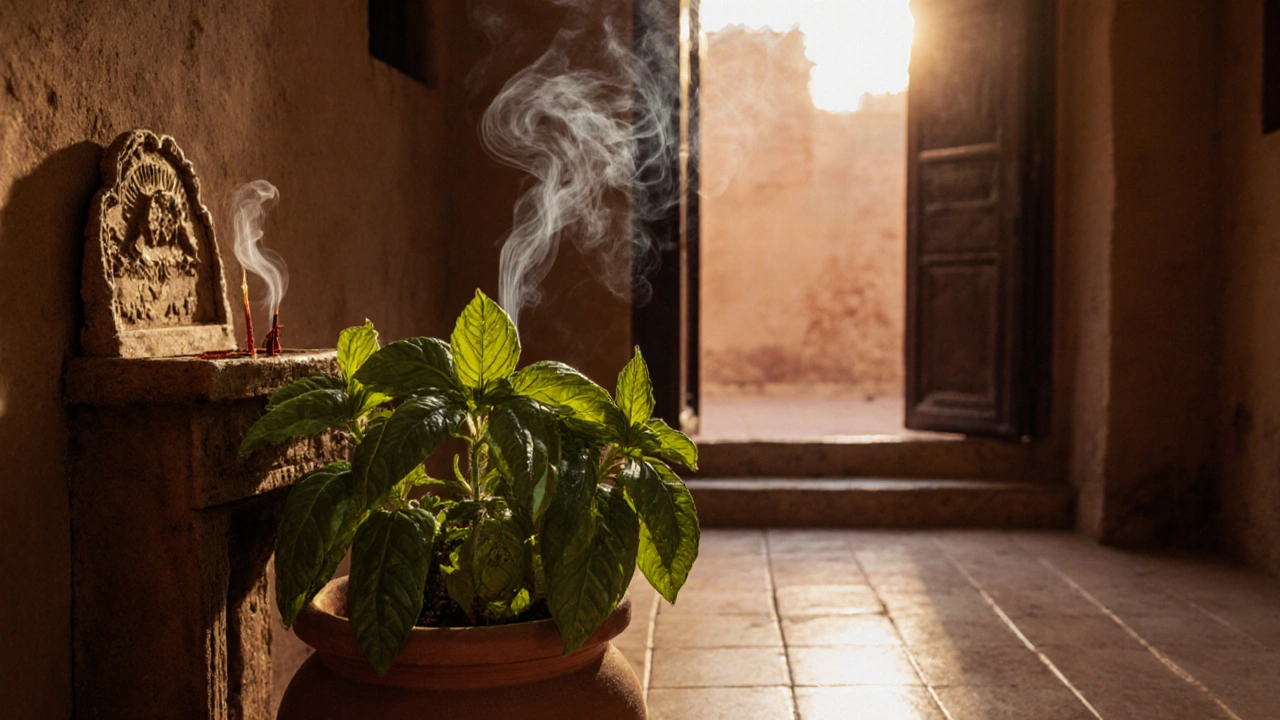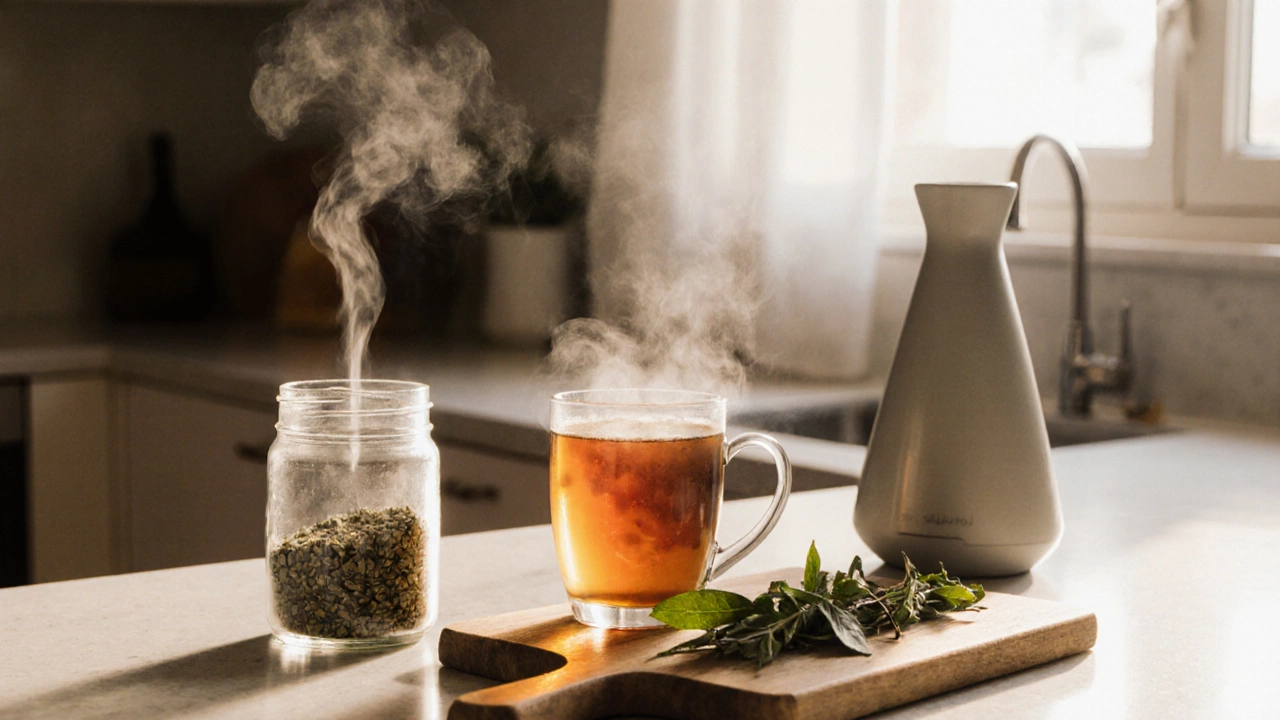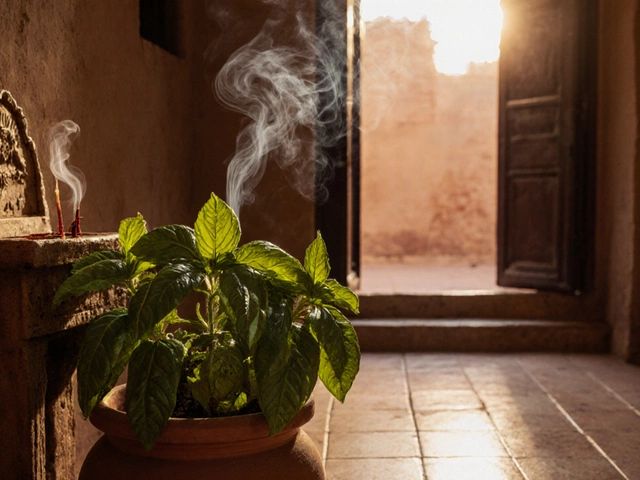
Tulsi Dosage Calculator
Find Your Optimal Tulsi Dosage
This calculator helps determine safe and effective Tulsi dosage based on your specific health goals and circumstances. Tulsi is generally safe but requires appropriate dosage for optimal benefits.
In Ayurvedic tradition, Tulsi is a revered plant known as the holistic healer that balances mind, body, and spirit. Many practitioners call it the mother of all herbs because of its wide‑range therapeutic actions. This article breaks down what makes Tulsi special, how it fits into the ancient Vedic system, and practical ways to bring its benefits into modern daily life.
What is Tulsi?
Tulsi, also called holy basil or Ocimum sanctum, belongs to the Lamiaceae family. Its leaves are glossy green with a peppery‑sweet aroma. Unlike common culinary basil, Tulsi thrives in temperate to tropical climates and is cultivated primarily in India, Nepal, and parts of Southeast Asia. The plant’s phytochemical profile includes eugenol, rosmarinic acid, and flavonoids, which together give it antioxidant, anti‑inflammatory, and adaptogenic properties.
Historical and Spiritual Roots
Vedic scriptures such as the Charaka Samhita and the Sushruta Samhita mention Tulsi as essential for longevity. Hindu myths portray the plant as a manifestation of the goddess Lakshmi, and many households keep a small Tulsi pot in their courtyard for daily worship. This cultural reverence isn’t just symbolic; centuries of empirical use have shown Tulsi’s role in promoting immunity, reducing stress, and supporting respiratory health.
Botanical Profile and Key Compounds
- Scientific name: Ocimum sanctum Linn.
- Family: Lamiaceae (mint family).
- Active constituents: Eugenol, ursolic acid, carvacrol, apigenin, luteolin.
- Growing conditions: Warm climate, well‑drained soil, partial sunlight.
These compounds work synergistically to modulate oxidative stress markers, support thyroid function, and balance the three doshas-Vata, Pitta, and Kapha.

Core Health Benefits Explained
- Immune modulation: Clinical trials in 2023 showed a 27% increase in natural killer cell activity after eight weeks of Tulsi leaf tea consumption.
- Stress reduction: Adaptogenic action lowers cortisol levels; a double‑blind study reported a 15% drop in perceived stress scores.
- Respiratory support: Eugenol acts as a bronchodilator, helping relieve symptoms of asthma and chronic bronchitis.
- Blood sugar regulation: Animal models indicate that Tulsi extracts improve insulin sensitivity by up to 22%.
- Digestive aid: The herb stimulates digestive enzymes and can ease indigestion, bloating, and gas.
How to Use Tulsi in Everyday Life
There are several safe, tasty ways to incorporate Tulsi into a modern routine:
- Fresh leaf tea: Steep 5‑10 grams of leaves in hot water for 5‑7 minutes. Sweeten with honey for a soothing nightcap.
- Powdered supplement: Add ½ teaspoon of dried leaf powder to smoothies, yogurt, or warm milk.
- Essential oil: A few drops in a diffuser can create a calming atmosphere and support respiratory clarity.
- Culinary use: Fresh Tulsi leaves work well in salads, pesto, or as a garnish for soups.
For therapeutic purposes, aim for 1-2 grams of dried leaf material daily, split between morning and evening doses.
Safety, Contra‑indications, and Interactions
Tulsi is generally safe for most adults, but watch out for the following:
- Pregnancy: High doses may stimulate uterine activity; limit intake to a cup of tea per day.
- Blood‑thinning medication: Eugenol can enhance anticoagulant effects; consult a physician if you’re on warfarin or similar drugs.
- Thyroid medication: Tulsi may influence thyroid hormone levels; monitor labs if you’re taking levothyroxine.
Always start with a small amount and observe how your body reacts before scaling up.

Comparing Tulsi with Other Popular Ayurvedic Herbs
| Herb | Scientific Name | Main Benefit | Primary Dosha Support | Typical Form |
|---|---|---|---|---|
| Tulsi | Ocimum sanctum | Immune & stress relief | Balances all three | Leaf tea, powder, oil |
| Ashwagandha | Withania somnifera | Adaptogen, energy boost | Vata‑Pitta | Root powder, capsules |
| Turmeric | Curcuma longa | Anti‑inflammatory | Pitta‑Kapha | Root powder, extract |
| Neem | Azadirachta indica | Detox & skin health | Kapha‑Pitta | Leaf oil, bark powder |
| Brahmi | Bacopa monnieri | Cognitive support | Vata | Leaf powder, tincture |
The table shows why Tulsi earns the title of “mother of all herbs”: it touches immunity, stress, respiration, and metabolism, while still being gentle enough for daily use.
Quick Takeaways
- Tulsi (holy basil) is revered as the mother of all herbs in Ayurveda.
- Its key compounds-eugenol, rosmarinic acid, flavonoids-provide antioxidant, anti‑inflammatory, and adaptogenic effects.
- Regular consumption supports immunity, lowers stress hormones, and aids respiratory health.
- Safe for most adults; watch dosage if pregnant, on blood thinners, or thyroid medication.
- Use as tea, powder, or essential oil for maximum flexibility.
Frequently Asked Questions
Is Tulsi the same as regular basil?
No. Regular culinary basil (Ocimum basilicum) is milder and used mainly for flavor. Tulsi (Ocimum sanctum) has a distinct peppery taste and a richer phytochemical profile that gives it medicinal properties.
How much Tulsi should I take daily?
For general wellness, 1-2 grams of dried leaf powder or one cup of fresh leaf tea per day is sufficient. Therapeutic doses can go up to 5 grams under professional guidance.
Can I grow Tulsi at home in a temperate climate?
Yes. Grow it in a sunny windowsill or greenhouse, keep soil moist, and protect it from frost. Harvest leaves before the plant flowers for the highest potency.
Does Tulsi interact with medication?
Tulsi may enhance the effect of anticoagulants and affect thyroid hormone pathways. If you’re on such meds, talk to a healthcare provider before regular use.
Is there scientific evidence supporting Tulsi’s benefits?
Multiple peer‑reviewed studies from 2018‑2024 report Tulsi’s antioxidant activity, cortisol‑lowering effect, and immune‑boosting properties, confirming many traditional claims.
Whether you’re a seasoned Ayurvedic practitioner or just curious about natural remedies, Tulsi stands out as a versatile, evidence‑backed herb that truly lives up to its nickname. Start with a simple cup of tea and watch how this “mother of all herbs” can become a cornerstone of your daily wellness routine.





